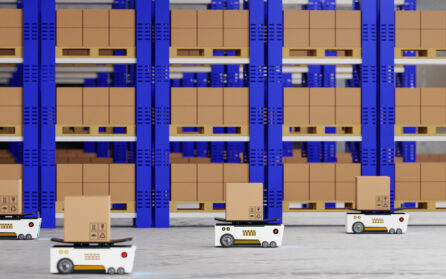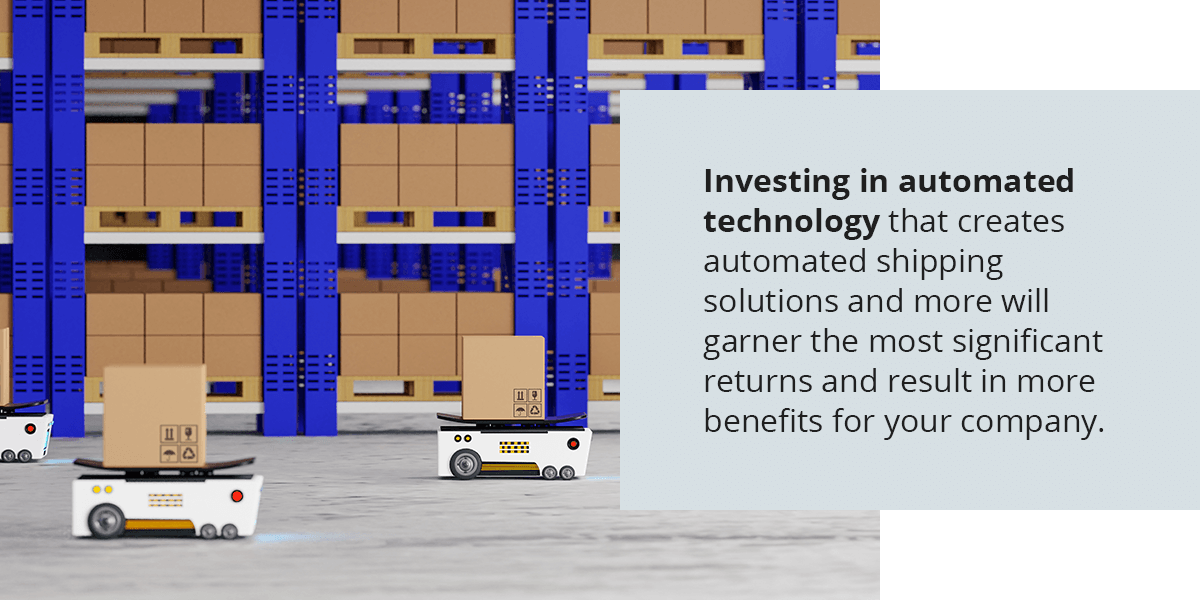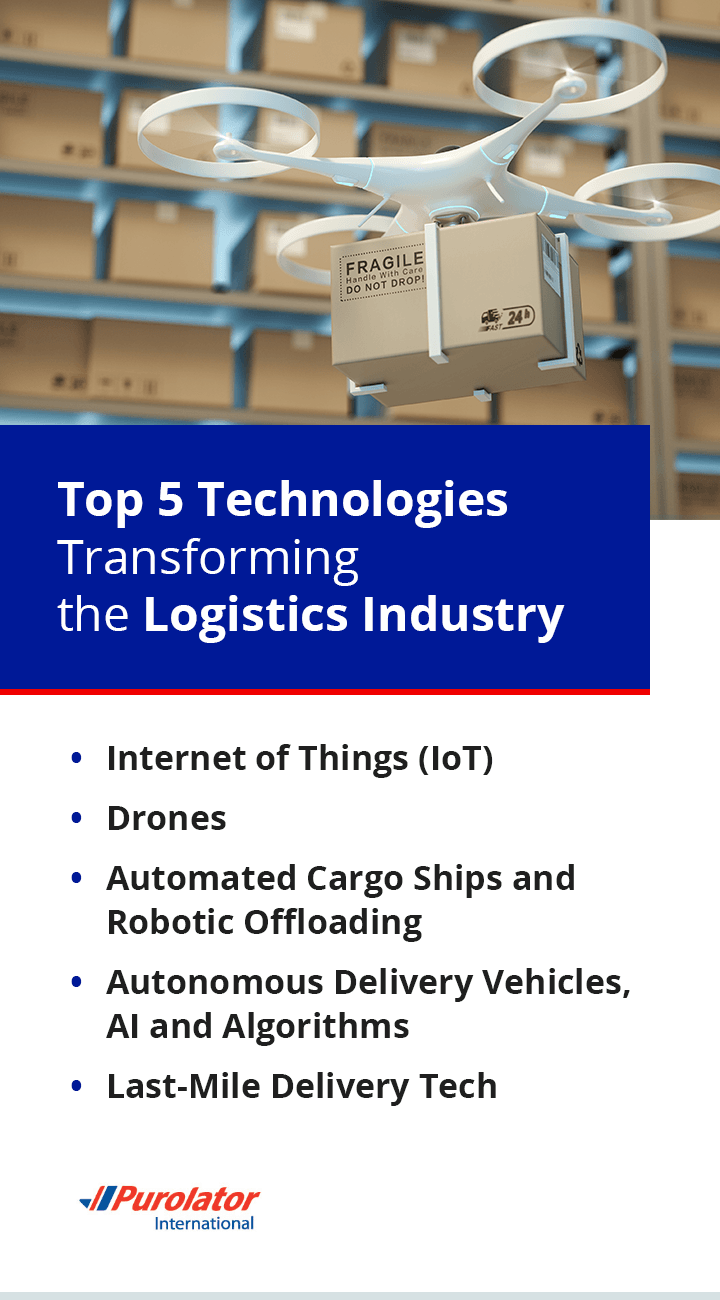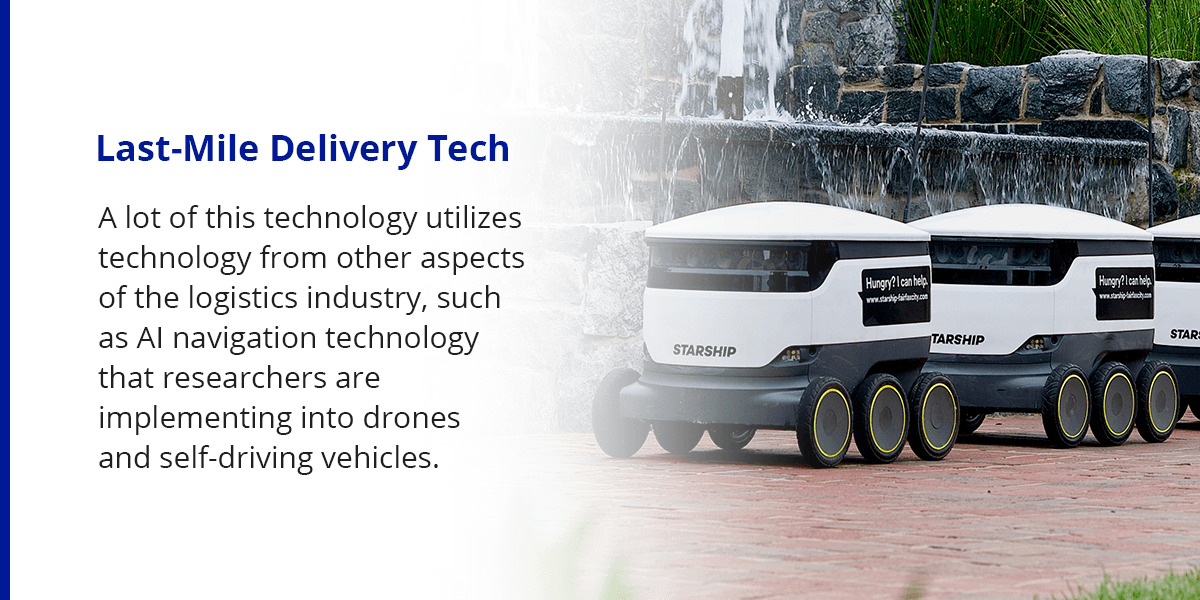Blog
How Automation Technology Will Change Logistics in 2022

As we continue to make new and exciting technological advancements, the logistics industry evolves rapidly to meet consumer demands. More and more people are shopping online than ever before, a trend which has only increased in recent years. When the COVID-19 pandemic hit, more people looked to online shopping methods to fulfill their everyday needs. This includes things such as clothing, home goods, recreational materials and even food deliveries.
As the pandemic continues to churn on with no clear end in sight, for the time being, more people are relying on their goods being shipped to them. We may even start to see a permanent shift towards online shopping in some areas as the added convenience of having what you need to be shipped to you when you need it appeals to a large demographic.
Supply Chain and Logistics Industry Trends in 2022
Now more than ever, we see a new shift in how technology in the logistics industry works in the modern world. The emergence of the pandemic and the continued growth of online retailers are showing an increase in demand. As people continue to shop online, the need for development only shoots up, where expected global GDP growth sits at 4.4% for 2022. In 2021 alone, we’ve seen a 6.5% growth demand in just North America and this trend will only continue well into 2022 and potentially even further.
The increase in demand is directly related to the rise we’ve seen in the logistics market size, which is projected to reach 12,256 billion by 2022. Market size growth has created a few current trends in the logistics industry.
- There has been a spike in online retailers as online shopping is becoming increasingly popular across the world. The increase we’ve seen in online shopping has directly increased the size of the market.
- New technology in the logistics industry, such as drone deliveries, is kickstarting the size of the logistics market as more people rely on these technologies to meet their demands.
- Globalization is rising, which plays a direct role in the logistics industry as more materials are shipped internationally.
- Environmentally friendly shipping technology trends are starting to emerge, allowing for specific market growth and a way to keep up with new regulations, particularly when shipping freight overseas.
This demand and increase in market size must be supplemented somehow, which is why we are seeing an increased focus on automation technologies that will assist in maintaining the supply chain. Almost every logistics company is looking to shift towards automation, with 84% of companies seriously considering making automation a part of their process. This is because automation serves as the next step in a successful business model, with consumers expecting customer support at all hours and increasingly fast service.
Automation and the use of AI allow logistics companies to meet these demands and keep up with supply chain trends. Automations exist in almost every part of the supply chain, at least in some way. And based on the numbers, automation will only continue to grow until it is implemented in every part of the logistics industry. There are certain investments that logistics companies can make to facilitate a smooth transition and yield a higher return on investment (ROI) and many of them revolve around automation.
When we look at the numbers, one of the best technological investments for higher ROI is communication technology. Many companies struggle to keep up with the amount of communication they receive daily, whether through email or the phone. So many that 54% of logistics companies say that it is their biggest challenge. Automation technology to help improve the existing workflow also see a high ROI. Customer service demands are also trending upwards, with more people wanting continuous customer service during the whole process.
Many companies are looking at automation technology, responsible for managing and keeping up with these demands to keep up with this. This will, in turn, increase customer satisfaction which breeds customer loyalty. Investing in automated technology that creates automated shipping solutions and more will garner the most significant returns and result in more benefits for your company.
New Technology in Innovating Logistics Companies
Our society is becoming used to instant gratification. We can get what we want as soon as possible thanks to the convenience of online shipping and fast delivery guarantees. Because of this, we are starting to see a shift toward automation technology that will make the process of shipping and receiving goods or services quicker than ever. With a customer-centered business world that relies heavily on convenience as part of any business model, it’s no surprise that new technology is appearing to meet these expectations.
Top 5 Technologies Transforming the Logistics Industry
Many logistics companies switch to these new, innovative technological advancements to keep up with demands. Much of this technology allows for a streamlined process that wasn’t possible before. But what exactly are these new pieces of technology and how are they helping facilitate smoother shipments?
Internet of Things (IoT)
IoT is just one of many pieces of technology that is being implemented in the shipping process. With the connectivity it provides, we see an increase in popularity due to its ability to connect with other devices or pieces of tech that support Bluetooth. More devices are currently connected to the internet than ever before and if we look at trends, that number is only set to increase.
IoT is already used in the logistics industry to control things such as temperature within a shipping container. Still, professionals are making developments to determine what other applications this technology can have. An added benefit of using IoT that has a lot of companies switching over is that it has become very affordable for the majority of companies as the cost has only decreased throughout the years.
Drones
Drones are becoming a popular choice for businesses trying to keep customers happy by getting their deliveries out to them as soon as possible. The use of these drones allows for shipments to be delivered much quicker to those who live near distribution centers and researchers are researching to expand to rural areas.
While this piece of technology may only currently be effective in certain areas and for smaller shipments, it leaves room for a jump in customer satisfaction as businesses are fulfilling orders sooner than they would be if these orders were shipped by traditional means. Drones also can reduce the amount of congestion we see on busy city roads by eliminating the need to send materials on the ground by instead delivering goods through the air straight from distribution centers.
Automated Cargo Ships and Robotic Offloading
Automated cargo ships are currently in development and are quickly becoming a viable option for the logistics industry in the foreseeable future. Freight ships handle most of the world’s cargo, so it is no surprise that companies are looking to simplify the process. A control center would monitor these autonomous ships remotely. The consistent monitoring of these ships can make way for safer shipments as the control center can alert the crew of any dangers.
Along with the research done with autonomous ships, research is also being conducted on ships that use sustainable energy to move. For example, a London-based organization is looking into wind power as a source of energy for these freight vessels, which will help companies keep up with regulations for sustainability that emerge due to the sheer amount of cargo shipped by freight alone.
We already see that some ports have already implemented robotic offloading technology to make the process as smooth as possible. A prime example of this is a port in Rotterdam, Holland’s Port. This port is seeing an increase in productivity and speed of handling due to robotic offloading tech, such as ship-to-shore cranes, that is monitored remotely from an office. Automated vehicles work with built-in hydraulic lifts to load and unload cargo. This new technology quickly improves how cargo is handled and reduces the amount of money companies spend on labor.
Autonomous Delivery Vehicles, AI and Algorithms
Automated technology isn’t just being developed for shipping freights but also for delivery vehicles as well. These vehicles would run on intelligent artificial intelligence (AI) that could be monitored remotely. Companies like Tesla are already making strides in developing this technology, where we are already seeing self-driving vehicles being developed for personal use.
These same companies are using this tech and looking at its applications in the logistics industry, with some logistics companies already using these innovations to handle offloading. The next step is to use this AI in delivery and freight vehicles.
AI is also being applied in other ways, such as developing tools to make navigation more efficient. This will come in handy when we see a shift towards self-driving vehicles in the logistics industry, but AI can pick the best routes to ensure quick and efficient deliveries even with human drivers. AI can also power drones and power warehouses, requiring less work from another remote employee. Instead, you will need to monitor this tech to ensure it works correctly rather than controlling it completely.
Last-Mile Delivery Tech
Many companies are adopting Last-mile delivery technology around the globe. A lot of this technology utilizes technology from other aspects of the logistics industry, such as AI navigation technology that researchers are implementing into drones and self-driving vehicles.
The ways they may try to implement this into last-mile delivery tech include tracking for packages so that the consumer can watch as their package arrives or no-touch deliveries, which are becoming more popular as the pandemic continues to rage on. Navigation technology is also being adopted for last-mile deliveries to ensure that deliveries can be made as quickly as possible without worrying about congestion in bigger cities.
This New Technology Is Already Making Waves Within the Logistics Industry
Many logistics companies are already implementing automation into their working systems, whether it’s introducing new AI or looking into robotic offloading or autonomous vehicles, and by doing so, keeping up with current trends. Companies are learning to adapt to keep up with customers’ demands and keep up with their competitors, many of which are already making the switch.
Automation provides the solution to many of the problems that exist within the logistics industry. For example, automation will assist with some of the backlog and congestion that we see. Many shipping companies end up backlogged well into the next year due to the sheer number of shipments received that have to be sorted and sent to the correct locations during the holiday season.
Automation technologies can assist in this process by increasing the speed that it allows. Hollan’s port sees a 50% increase in the rate at which they can handle their cargo, and that’s just from robotic offloading.
Congestion is another reason that many companies are looking towards automation as well. Holiday seasons aside, many people are still shopping online daily and many companies experience congestion due to the massive amount of shipments they require. Technologies such as delivery drones can assist with this congestion by providing same-day deliveries on smaller items to consumers near distribution centers. Amazon is currently optimizing this technology to accommodate the amount of orders they receive and shipments they make daily.
One of the most important reasons we see a shift towards automation is its pure ease and convenience. Automated logistics companies deliver shipments sooner and more efficiently. Automation also offers reliable tracking for the consumer, which plays a big part in overall customer satisfaction. Most retailers aim to provide high levels of customer satisfaction, and so they look to work with logistics companies that are making the switch with these new technologies.
Look No Further Than Purolator International
No matter what you’re shipping, finding the right logistics company is an essential part of maintaining a quality relationship with your customer base. Consumers want their goods as quickly as possible and Purolator International works hard to do just that.
We are the best choice for all U.S retailers looking to ship to Canada and provide real-time tracking for all of our shipments. We work hard to ensure that your shipments are delivered as fast and efficiently as possible. Contact us today to speak to our highly trained logistics specialists and rest easy knowing that you’re in good hands.



